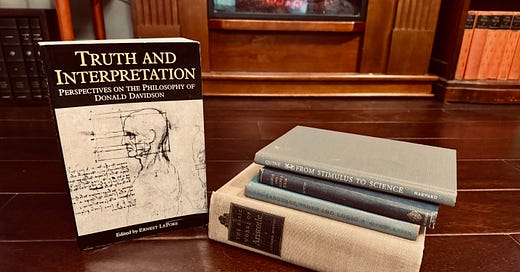The Context of Contemporary Epistemology: Foundationalism, Coherentism, Empiricism
Lecture 6 of Theological Epistemology: Putting the classical v. presuppositional apologetics debate in the context of contemporary philosophical epistemology
Divides in theology are, frequently, simply manifestations of philosophical divides. This is clearly the case for the divide between classical and presuppositional approaches to theological epistemology. The classical method requires a foundationalist account of knowledge, an order of knowledge (which is the reverse of the order of being). The presuppositional one depends on such dictums as “All knowledge begins from presuppositions,” which is closely tied to coherentist epistemology. The theological divide reduces to the philosophical divide between foundationalists and coherentists.
In this lecture, we consider the different types of foundationalism and coherentism, and the arguments for and against them. We will see that the contemporary philosophical debate is beholden to modern, post-Cartesian assumptions, as is the presuppositional theological epistemology. With philosophical context, we can see our way through the theological thicket, and to the possibility of a foundationalism without modern restrictions.
The introductory section of the lecture I make available for free. To view the rest of the lecture content, become a paid subscriber to The Natural Theologian. You’ll get access to the rest of this course plus any other paid course content I create over the next year.
Course Syllabus
Previous Lectures
The Epistemology of Arguments for God, Modern and Contemporary
The Context of Contemporary Epistemology: Foundationalism, Coherentism, and Empiricism
Lecture Contents
Introduction: Presuppositionalism in Epistemological Context
Classical Foundationalism and Coherentism
Logical Positivism and Non-Classical Foundationalism
Presuppositionalism Revisited
1. Introduction: Presuppositionalism in Epistemological Context
Our theological empiricist argument relied on an Aristotelian foundational account of the structure of knowledge: The order of knowing is the reverse of the order of being. We begin with knowledge via the senses and proceed by demonstration to the existence of God. This is a foundationalist account of the structure of knowledge.
Meanwhile, presuppositionalism assumes an approximately coherentist view of knowledge: You can only get Christian beliefs from other Christian beliefs. The debate between theological empiricists (classical apologists) and presuppositionalists is therefore a manifestation of the philosophical divide between foundationalists and coherentists.
2. Classical Foundationalism and Coherentism
According to foundationalism, all knowledge requires basic beliefs as premises that are not themselves justified on the basis of other beliefs. Classical foundationalism is the view that these basic beliefs must be indubitable and infallible, following Descartes, therefore knowledge of seemings or appearances, and not of objects in the external world.
Coherentism holds that all beliefs require other beliefs as justification. Accordingly, there cannot be foundational beliefs, and justification must proceed in a circle, or perhaps a complex web, with no beliefs claiming a uniquely foundational role.





